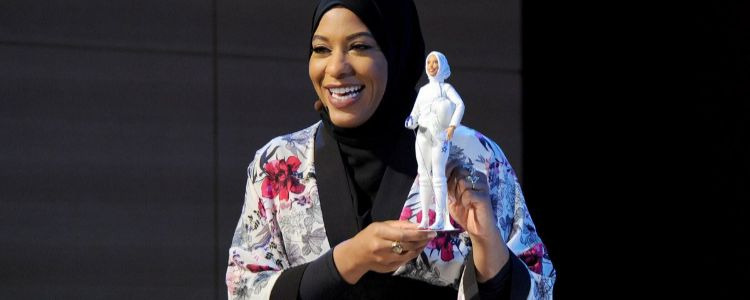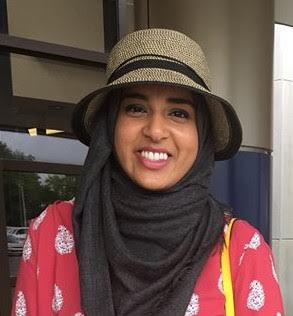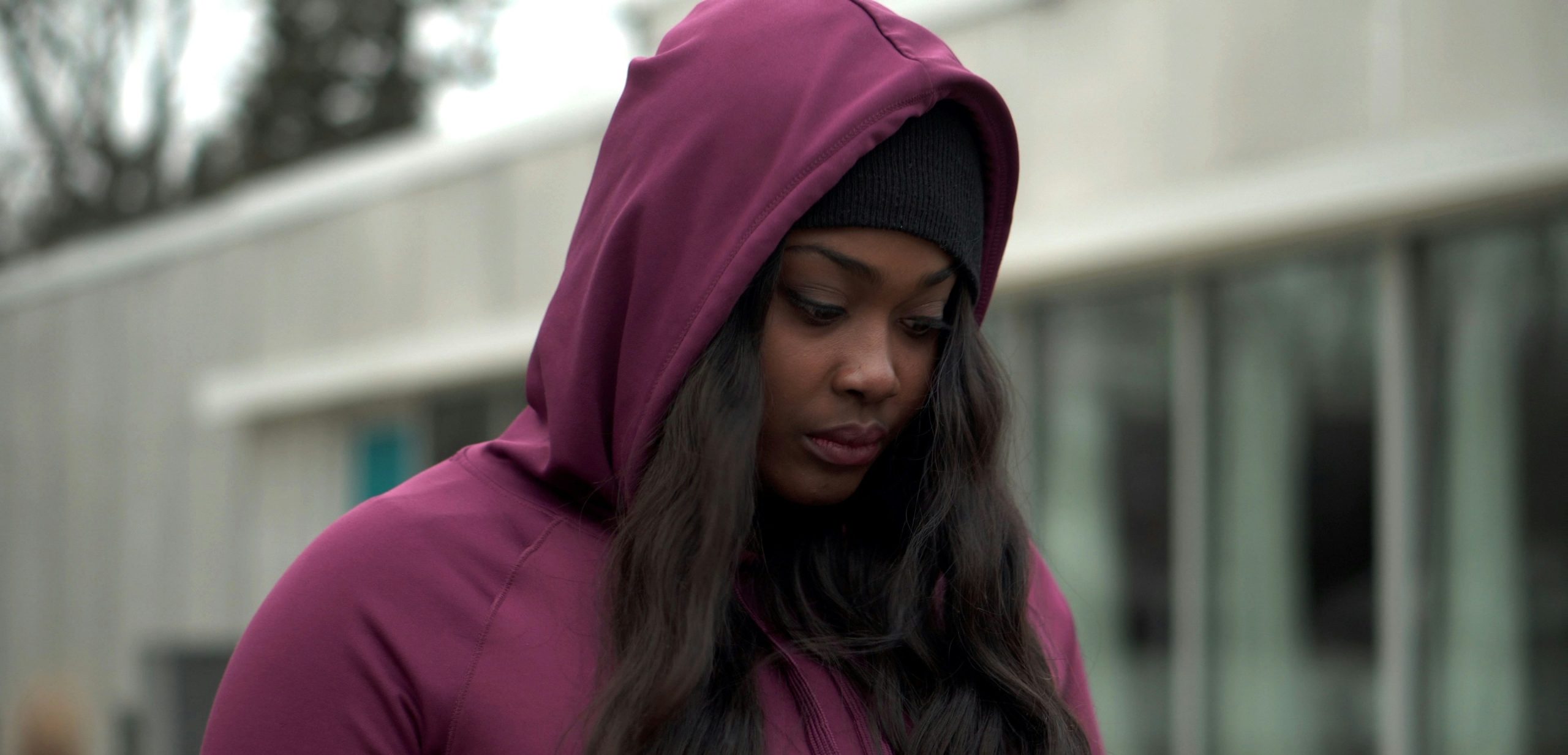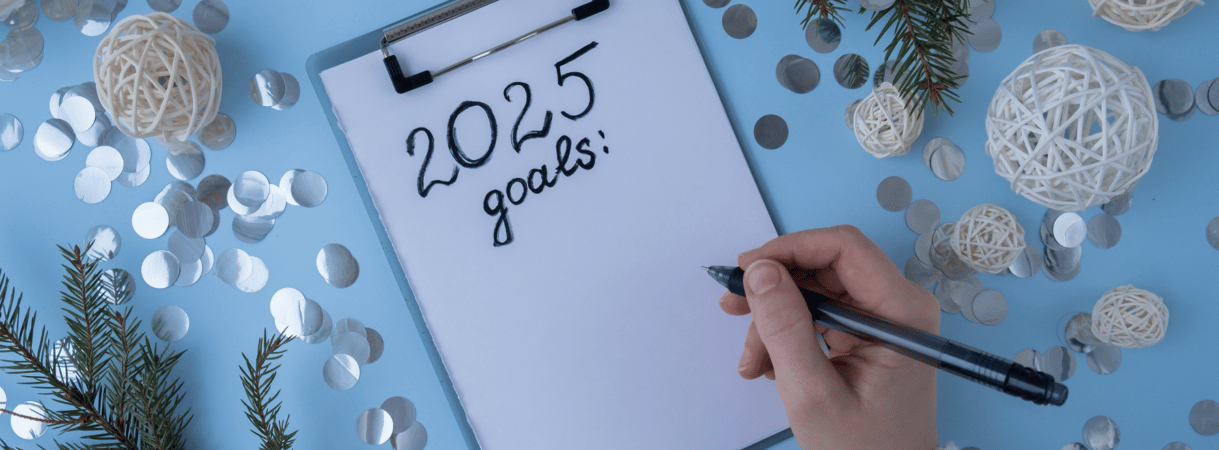My body began to shake. It started at my core and radiated slowly outwards, like those concentric circles you might see in a tree stump. Or as a rock falls into a lake, the way each smaller ring chases the one just bigger than it.
I’d had many public speaking roles and had never been afraid of hearing my voice amplified for a large crowd—but I was not prepared for this. There, on the stage, just a few round tables ahead of me sat my role model. The first hijab-donning American to compete (and win, I might add) in the Olympics. A fashionista with her own clothing line. A badass fencer. A voice for young girls, Muslim and otherwise.
Ibtihaj Muhammad.
And I was about to stand up in front of a room of 300 and ask her a question during the Q&A portion of her talk. I’ll spare you the humiliating details of how I asked about her experience with fatigue in a way that made her go, “Well, I never thought about that as a mental health issue, but I guess…” About how I nearly missed my seat as I paused halfway through sitting down, shooting a sarcastic wave to my friends who bust out laughing at the way I had confused my idol in front of all those people.
Note: in no way am I saying there is anything wrong with having a mental illness! Rather, it was my phrasing of the question that gave her pause.
Of course, despite the way I had rambled with my question, she answered with perfect poise and quickly identified the need to smash mental illness stigma with such precision, you would have thought she was wielding her sabre as she did it. Her answer was comforting and very much in line with her refusal to fear speaking her mind. She was so honest and real that night and my respect for her grew with every new experience she shared. During her speech, Ibtihaj Muhammad identified the many ways in which she has been dissed, discriminated against, bet against, and hated on during her journey to becoming one of the top fencers in the world. However, she also spoke about the immense support she got and continues to receive from her family and friends to keep her strong and focused.
She told us about the “this-is-fate” way in which she first discovered fencing; through the window, she spotted her school’s team practicing in the cafeteria and noted that their uniforms allowed for full coverage, something she sought as a young Muslim athlete. She related tales of recognizing and overcoming internal and external obstacles and I was so inspired by her that I began to plan out my next career steps right then and there. The calm but powerful manner of her speech made me feel like I could take on anything life threw at me.
And I’m not the only one who looks up to Ms. Muhammad.
To celebrate Muhammad’s excellency, Barbie has come out with its first doll with a hijab, the traditional head-covering for many Muslim women. The doll is part of Barbie’s “Sheroes” collection and Ms. Muhammad joins the likes of Ashley Graham and Misty Copeland, women who have noted struggles with their own body image and are now a voice for health and self-love.
Now, I know that Barbie as a brand and as a toy has had its controversies. Should we be allowing our youth to play with dolls that represent such an unattainable ideal? Where’s the diversity? Are dolls just setting us up for body image issues and eating disorders down the line?
This time, I think they got it right.
As a kid, Barbies were my life (sorry Beanie Babies, but you come in a close second). They were the only birthday present I ever wanted. I had boxes upon boxes of the dolls, the toy mansion with a working elevator, and a computer game where Detective Barbie and I had to solve a mystery at an amusement park (I never did finish that game. Admittedly, it still gives me the creeps).
Perhaps unrelated, but as a kid I also found myself constantly wishing my hair was a lighter color, that my skin was fair, and that I was thinner. I was both the only Muslim and the only South Asian girl at my school and I thought that maybe if I looked like the other girls, I would fit in with them better. I felt that if my hair flowed like theirs did or if I looked cute in an Aeropostale polo like they could, I would be more worthy of love.
I was eight years old.
I won’t lie, as a young woman in recovery from an eating disorder, I still feel that way sometimes. That’s why I was so moved when I found out that Barbie would be coming out with this doll. And I am willing to bet money that my perception of beauty would have been much more forgiving and all-encompassing as a kid had Ibtihaj Muhammad-Barbie existed back then.
There will be opposition to the doll. There always seems to be in cases like this. In fact, even I was tempted to begin picking away at how we talk about the doll’s physique. I do think that we should be careful about the ways in which we praise the Barbie’s “large athletic build” so as not to shift our #bodygoals to this Barbie rather than allowing it to free us of our need to subscribe to a body ideal at all. However, compared to the arguably unhealthy proportions of dolls past, it is very exciting to see representation of other body types. To value all that our bodies allow us to do. Like win Olympic medals.
Overall, I believe that this doll is a major step in the right direction for Barbie. I’m tempted to get one for myself. I may be 25 years old, but are you really ever too old for something like this?
I believe that despite whatever negative messages arise and whatever opposition presents itself, for the most part we can all look at this and say, “We needed this.”
I know I did.
Yusra is a writer, blogger, and fierce mental health advocate currently in her first year as a Doctor of Physical Therapy student. Yusra hopes that through her work as a physical therapist, she will be able to value mental health and the role it plays in physical wellness. Yusra is an avid writer and her pieces on mental illness and recovery have been featured on The Mighty and Recovery Warriors. She channels her passions through her blog, The DPT Diaries and Instagram pages [@thedptdiaries, @yiftikhar] to spread mental health awareness and provide information to pre-health students as they apply to graduate school. Check out her pages to stay up-to-date on all of her recovery and grad school adventures!
Photo via Twitter






